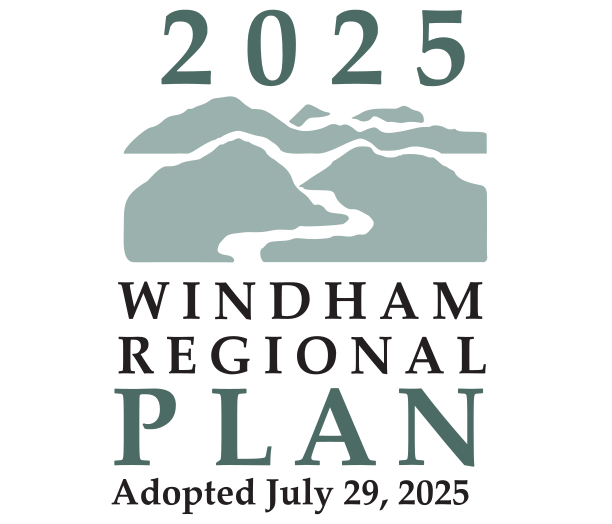Community Utilities, facilities, and services
Health Care Services and Facilities
Health and human services and facilities are important to the health and well-being of the public. These services include care for children, the elderly, and persons with physical and mental disabilities, as well as services to support impoverished families and individuals. The Windham Region has an aging population that will increasingly need care and new facilities in the coming decades. The rising cost of healthcare raises concerns regarding the financial condition of regional hospitals and healthcare facilities. Meanwhile, disparities in income and growing issues around substance use and mental health are increasing demands on social service agencies and their resources of food, shelter, heat, and other needs.
This plan also recognizes the importance of the built environment in influencing public health outcomes. This includes how we design and plan for our homes, streets, infrastructure, workplaces and open space. A lack of opportunities for walking, recreating, and socializing with others can lead to an increase in rates of obesity, heart health, mental health problems, and isolation. The Land Use chapter of the plan addresses community design and land use recommendations to help support healthy lifestyle options.
hospitals
Six hospitals serve most of the region’s general and emergency medical care needs: Brattleboro Memorial Hospital, Southwestern Vermont Medical Center in Bennington, Rutland Regional Medical Center, Springfield Hospital, Mount Ascutney Hospital in Ascutney, and the Cheshire Medical Center/Dartmouth-Hitchcock in Keene, NH. These hospitals have facilities that provide surgery, X ray, outpatient, laboratory, and physical therapy services. The Grace Cottage Family Health Center and Hospital in Townshend provides primary care, rehabilitation, wellness, prevention, inpatient care, and emergency services. The Dartmouth-Hitchcock Medical Center in Lebanon, New Hampshire and hospitals in Massachusetts and New York provide more specialized medical care for the region.
The Mountain Valley Health Center in Londonderry, Rockingham Health Center in Bellows Falls, and the Deerfield Valley Health Center and Green Mountain Healthcare in Wilmington, along with the region’s many medical offices, serve the day to day health care needs of the region. In order to provide immediate emergency health care, the Stratton Mountain and Mount Snow resorts provide health care facilities staffed by physicians during the ski season.
The financial condition of the region's hospitals is of primary concern, as it is for rural areas across the country. The level of service that hospitals can provide is determined to a great extent by the resources available to purchase new equipment, upgrade facilities, and attract and retain physicians and other staff. In recent years there has also been a trend in smaller hospitals affiliating with the larger Dartmouth-Hitchcock Health for financial and maintaining service level reasons. For example, Cheshire Medical Center and Southwestern Vermont Medical Center now have affiliations with Dartmouth-Hitchcock.
mental health
Mental health services are provided by Health Care & Rehabilitation Services of Southeastern Vermont and the Brattleboro Retreat. The Brattleboro Retreat is one of this country’s oldest and largest independent mental health organizations, and provides a full range of psychiatric in patient care and a variety of out patient services. Health Care & Rehabilitation Services of Southeastern Vermont has extensive outpatient programs in a number of towns in the region.
elder care
As the population continues to age, there will be a growing need for nursing homes and residential care facilities that are convenient to resident’s families and homes. As of 2021, there were only 3 nursing homes, 2 assisted living centers, and 5 residential care facilities in Windham County. The Valley Cares facility in Townshend provides both independent living and assisted living facilities and is one of the few examples of this type of facility in the region. Without the development of more elderly housing options, residents in need of care and assistance may need to find facilities outside of the region. New facilities should be encouraged in village and town centers to take advantage of existing infrastructure, services, and pedestrian amenities.
Southern Vermont Home Health Agency and the Visiting Nurse Alliance of Vermont and New Hampshire are the primary home health care agencies in the region that provide care for residents ageing in place. Two others, Brattleboro Area Hospice Care and Bayada Home Healthcare, are located in the Brattleboro area, and a third, My Community Nurse Project, serves residents in Weston and Londonderry as well as three other communities outside of the Windham Region. Home health care service providers are Medicare certified by the Vermont Department of Disabilities, Aging and Independent Living.
human services
Helping people meet their needs is essential to the social and economic well-being of the region. There are a variety of reasons why residents may need help: poverty, illness, language and cultural barriers, lack of education, physical and/or mental disability, addiction, and isolation are just a few of those reasons. Supporting approaches that prevent problems from developing and that meet the needs of residents in the region is critical. Among the challenges to the region’s human service agencies are an aging population, poverty, substance use, and a lack of affordable housing.
Over 100 organizations and agencies provide a variety of programs to meet the region's human service needs including social services and nutrition programs for elders, energy assistance for low income households, employment referral services, emergency food and shelter programs, and a range of programs for children. To better support residents, these organization and agencies often collaborate with one another and with healthcare and housing agencies.
As in many rural areas, access to services can be a challenge for households that do not have a car or who cannot afford much gasoline. Access not only includes being able to physically reach the service but also includes outreach and technology that make people aware of the services.
